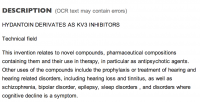What you're describing is the worse case scenario.
It's likely that the drug gets an expanded access, that could let the more lucky of us get it in the next 1,5 years, and most of us in the next 3 years.
I was told by my audiologist that the AM101 had an expanded access in certain regions, including Montreal, I have the business card ot the person in charge of giving access and I am gonna call her soon to discuss.
View attachment 2362
I live in Montreal too so let me know how that goes


 Member
Member
 )
)